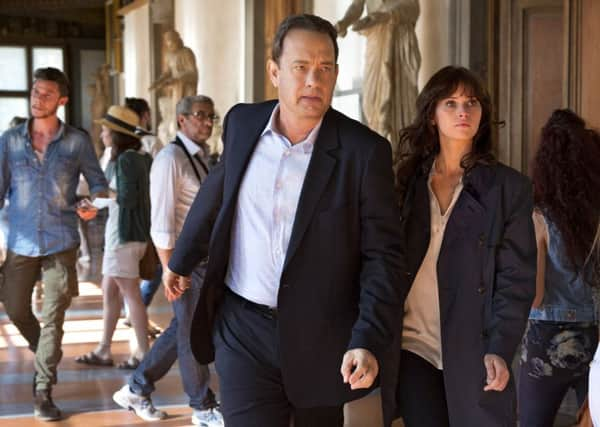Film reviews: Inferno | American Honey | Storks


Inferno (12A) *
American Honey (15) ***
Storks (U) *
It takes real effort to make a film as heroically awful as Inferno, so if nothing else Ron Howard and Tom Hanks deserve credit for their ongoing commitment to bringing the Dan Brown-sourced franchise to the big screen in such dire fashion. Following the puzzling popularity of The Da Vinci Code and its rubbish sequel Angels and Demons, this latest instalment propels Harvard symbologist Robert Langdon (Hanks) on another ludicrous adventure. It might not boast anything quite as hilariously terrible as the sight of Ewan McGregor parachuting into the Vatican (as witnessed in Angels and Demons), but it does kick off in a way that beggars belief. After suffering an apparent gunshot wound to the head, Langdon wakes up in a hospital in Florence and, beset with hallucinatory visions of a plague doctors and devils straight out of Dante’s Inferno, he’s propelled on a high-speed chase through the medieval city.
The visions, we’re soon told, are the result of his aforementioned head trauma, which has also left him with no memory of how he got there. Perhaps under the impression that he’s making a Bourne movie, Howard shoots everything here with a jittery handheld camera to echo Paul Greengrass’s ubiquitous shooting style, although Howard’s determination to amp everything up further with lots of rapid cutting and some gaudy visual tricks (designed to replicate Langdon’s confused mental state) is actually more reminiscent of Michael Bay. Indeed, Howard seems to have lost any sense of how to tell a story here: he just throws images and flash-cuts around in the presumed hope it will generate pulse-pounding excitement. It doesn’t, not even when it becomes apparent that Langdon will have to track down yet another cataclysmic doomsday device.
Advertisement
Hide AdThis one – as the repeated references to Dante are supposed to make clear – involves a madman’s determination to wipe out billions of people in an attempt to save the planet from humanity’s virus-like spread (he’s played with cackling glee by Ben Foster). Langdon’s chief companion this time out is a British doctor played by Felicity Jones, who really does do her best to make her character interesting, despite receiving no help from the script. The same goes for Hanks and it’s a sign, perhaps, of how dull a character Dan Brown has created that, after three films, one of the world’s most likeable movie stars can’t make him appealing. In this one Langdon simply bounces from clue to clue, his memory conveniently coming back any time he needs to get out of a dangerous scrape. As a character, though, he has no agency of his own; he’s just a pawn, designed to link various convoluted set-pieces together. He no longer even has that spectacularly funny mullet to distinguish him. The end result feels like a special circle of cinematic hell designed for those who no longer care what movie is on screen, only that it’s noisy and full of meaningless destruction.
Next to this, Andrea Arnold’s American Honey should feel like a masterpiece. Her US debut (after Red Road, Fish Tank and her artful adaptation of Wuthering Heights) is the antithesis of what we think of as mainstream commercial filmmaking in every way but one – at close to three hours it’s incredibly indulgent, to the point where any goodwill towards what she’s attempting starts to dissipate. That may be the point of course. Perhaps she’s attempting to challenge audiences who’ll sit through an incomprehensible three-hour Transformers movie, but balk at doing the same for an art film with naturalistic performances and a meandering plot that’s closer to our actual lives. The fact that she’s cast Transformers star Shia LaBeouf suggests that might be part of her MO. Sadly, that doesn’t automatically make it a great movie. Part of the issue is that apart from the punishing length, the film really isn’t all that radical. The poetic naturalism that’s been feature of her British films remains very much intact, but there’s nothing here that hasn’t been seen in, say, the films of Kelly Reichardt, who’s been making powerful, low-key movies about people living on the fringes of American society for the last 15 years, and whose experimental use of different aspect ratios Arnold also shares. That last feature is the most immediately striking thing about American Honey. The boxy frame reflects the hemmed in status of the protagonist, Star (newcomer Sasha Lane), an 18-year-old woman we first see dumpster diving for food to feed her younger siblings (or stepsiblings – Arnold keeps the exact details ambiguous). When she happens across a group of feral travellers led by the charismatic Jake (LeBeouf), she’s presented with a chance for escape – one she impulsively takes and which leads her on an odyssey across the US working for a tough young woman (Riley Keough) selling magazine subscriptions door-to-door. What emerges is a sprawling coming-of-age film that deliberately tempers the romanticism of the landscape with the rawness of a life lived tethered to the bottom rung of the societal ladder. It’s as brilliant and compelling as it is maddening and repetitious.
Storks, on the other hand, is back to the idiocy of Inferno, albeit this time in a kid-friendly format. Never quite thinking through the logic of using the old joke about storks delivering babies to make a family film with saccharine life lessons about parenting, it serves up a nonsensical plot, lots of bright colours and a raft of celebrity voices (Andy Samberg, Jennifer Aniston, Ty Burrell), but not much else.